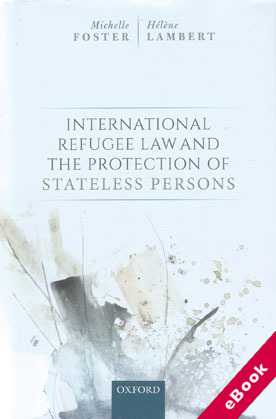
The device(s) you use to access the eBook content must be authorized with an Adobe ID before you download the product otherwise it will fail to register correctly.
For further information see https://www.wildy.com/ebook-formats
Once the order is confirmed an automated e-mail will be sent to you to allow you to download the eBook.
All eBooks are supplied firm sale and cannot be returned. If you believe there is a fault with your eBook then contact us on ebooks@wildy.com and we will help in resolving the issue. This does not affect your statutory rights.
Statelessness and International Refugee Law examines the extent to which the 1951 Convention relating to the Status of Refugees protects de jure stateless persons. While de jure stateless persons are clearly protected by the 1954 Convention relating to the Status of Stateless Persons, this book seeks to explore the extent to which such persons are also entitled to refugee status.
The questions addressed include the following: When is a person 'without a nationality' for the purpose of the 1951 Refugee Convention? What constitutes one's country of former habitual residence as a proxy to one's country of nationality? When does being stateless give rise to a well-founded fear of persecution for reasons specified in the 1951 Refugee Convention and/or UNHCR mandate? What are the circumstances under which statelessness constitutes persecution or inhuman or degrading treatment? How are courts assessing individual risk or threat to stateless persons?
The book draws on historical and contemporary interpretation of international law based on the travaux préparatoires to the 1951 Refugee Convention and its antecedents, academic writing, UNHCR policy and legal documents, UN Human Rights Council resolutions, UN Human Rights Committee general comments, UN Secretary General reports, and UN General Assembly resolutions. It is also based on original comparative analysis of existing jurisprudence worldwide relating to claims to refugee status based on or around statelessness. By examining statelessness through the prism of international refugee law, this book fills a critical gap in existing scholarship.
The book draws on historical and contemporary interpretation of international law based on the travaux préparatoires to the 1951 Refugee Convention and its antecedents, academic writing, UNHCR policy and legal documents, UN Human Rights Council resolutions, UN Human Rights Committee general comments, UN Secretary General reports, and UN General Assembly resolutions. It is also based on original comparative case-law analysis of existing jurisprudence worldwide relating to claims to refugee status based on or around statelessness.